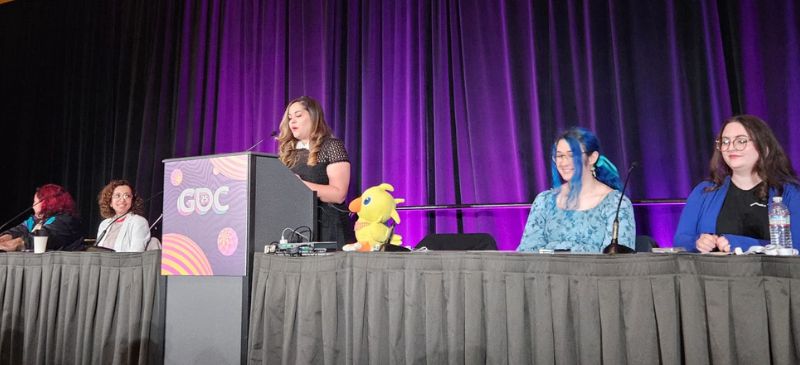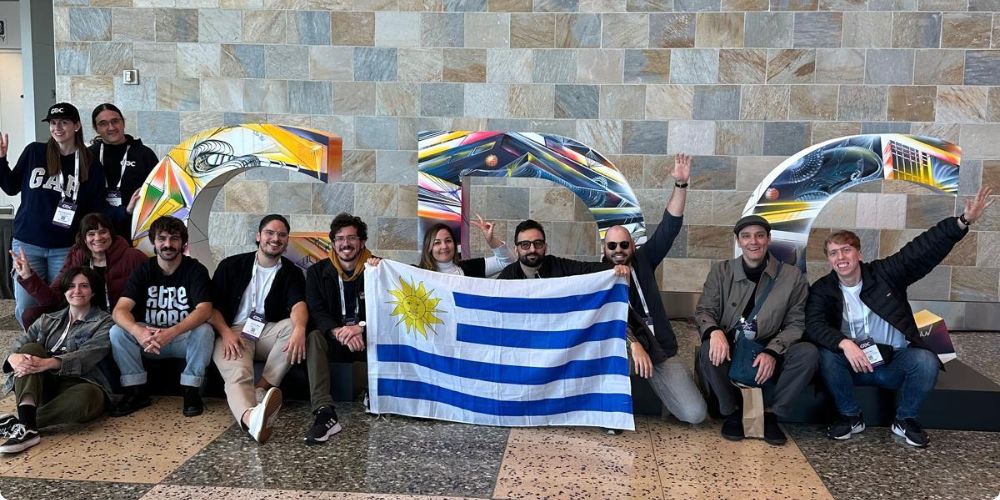- Home
- About us
- News
- Events
- EXPORT Export
-
BUY
Buy
Buy
- INVEST Invest
- COUNTRY BRAND Country Brand
-
INFORMATION CENTER
Information center
InformationCenterInformationCenterReports Country reports Department reports Foreign trade reports Product-Destination worksheet Sectors reports Work documentsStatistical information Classification Uruguay XXI Exports Imports Innovative National Effort Macroeconomic Monitor Tools Buyers Exporters Investors
- Contact
-
Languages
Laia Barboza: the Uruguayan voice leading diversity in the global video game industry
The Game Developers Conference organization once again chose the member of the studio Pincer Games to manage and direct the emblematic panel #1ReasonToBe
Share:

At the Game Developers Conference (GDC), the event that brings together the video game industry worldwide, Uruguay reaffirmed its growing presence. Among the stands, technical conferences, and business rounds that brought together tens of thousands of professionals, a Uruguayan voice emerged with a unique leading role: Laia Barboza. Co-founder of Pincer Games and a key figure in the local ecosystem, she was not only part of the national delegation, but for the third consecutive year, she was the manager and moderator of the influential #1ReasonToBe panel, a space dedicated to diversity and inclusion in video games, which resonates strongly at the most crucial event in the sector.
“It’s the oldest diversity panel at GDC,” said Barboza, recalling its origins in 2013 with legends such as Brenda Romero (head of Wizardry video games) and Leigh Alexander (video game writer and journalist) before the responsibility fell to her.
Under her curatorship, the panel focused on women from diverse parts of the world, many from emerging territories. “It’s a very well-regarded panel, very famous among those who attend, and it’s very dynamic because you can find many different realities from all over the world,” she said.
It’s a production job that takes her a whole year and involves identifying and selecting the panelists, contacting them, and thinking about the topics.
The 2025 edition reflected a search for diversity and depth. It featured the participation of Morgan Baker, a deaf accessibility specialist from Electronic Arts; Hanan Makki, a doctor from Saudi Arabia who uses serious games to help children with autism; Javiera Sepúlveda, a Chilean developer based in Germany who faced death threats for creating a community of women in her country; and Liana MacKenzie, a trans-American designer who shared her experience in a complex political context.
“It was very emotional; we all ended up crying after Liana gave her talk,” Barboza confesses. The panel thus becomes a mirror of struggles, resilience, and, above all, of the powerful reasons why these creators persist. ‘It’s a moment to be inspired, to see beyond,’ reflected Laia, highlighting how these stories even impact developers in established markets. It serves as a reminder that “video games are more than commercial titles, more than numbers; they are human stories and an art form that many people adopt as a lifestyle,” she explained.
In this global scenario, Laia Barboza stands out as a multiple reference point: a woman, Latin American, and Uruguayan, leading a crucial conversation about diversity, equity, and inclusion at a time when these values face resistance. The presence of the Uruguayan demonstrates that voices from smaller countries can have a significant impact on shaping a fairer industry.

Uruguayan momentum
Laia’s participation is not an isolated event; it reflects a Uruguayan video game ecosystem that, although young, has consolidated and continues to grow. With more than 60 active studios (13 of which were present at the GDC), Uruguay has developed a solid foundation, which is driven by the joint work of the Uruguayan Chamber of Video Game Developers (CAVI) and the promotion agency Uruguay XXI to position the country as a hub of creative talent, diversity, and export quality.
As Barboza explains, there is “equal work between the private and public sectors so that all studios and companies can visit the Game Developers Conference,” facilitating access and presence that would otherwise be prohibitive.
The robust Uruguayan delegation at GDC 2025 included established companies such as Ironhide Game Studio (creators of the acclaimed and popular Kingdom Rush) and Pomelo Games (creators of Outlanders), together with new ventures such as the cooperative Entrevero, which are a testament to this vitality.
The Uruguay Video Games stand, coordinated by Uruguay XXI, showcased a catalog of national studios and video games and functioned as a strategic meeting and networking space for the local industry, strengthening the spirit of collaboration between the different players in the sector. “It was full of Uruguayans, always together; it was great, and we helped each other,” said Laia, referring to the atmosphere at the fair.
As she relates, the fact that Kingdom Rush is a Uruguayan creation continues to generate surprise and admiration, even among prominent industry figures at the GDC. “Everyone plays that game. It’s incredible,” she said. This international recognition shows that Uruguay not only exports quality video games but also talent capable of influencing significant conversations in the sector at a global level.
In this context, Laia’s experience and leadership on the #1ReasonToBe panel reflect the values that Uruguay seeks to project: critical thinking, commitment to equity, and participation in constructing a more diverse and representative industry. Her presence in this international space contributes to consolidating the image of an innovative, inclusive country with a voice of its own on the global stage.
